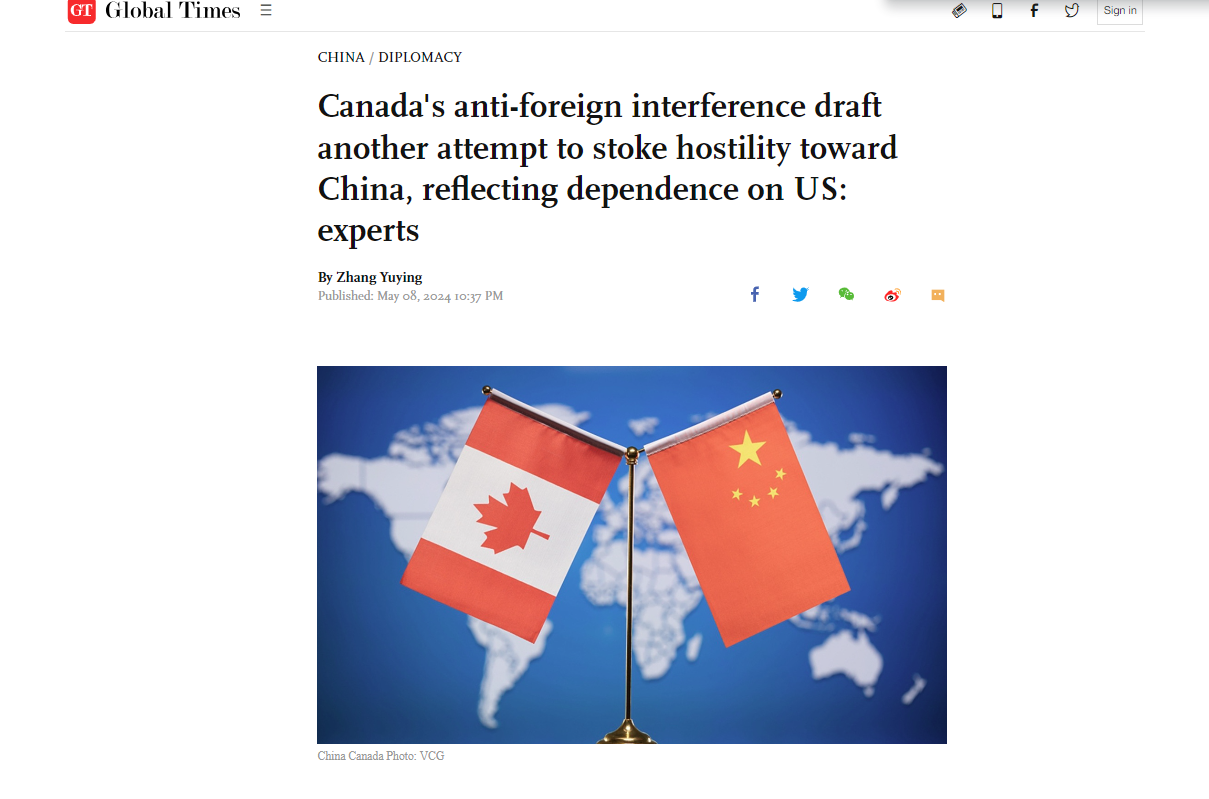LATEST INSIGHTS
Your Present Location: LATEST INSIGHTSWang Yiwei: Canada's anti-foreign interference draft another attempt to stoke hostility toward China, reflecting dependence on US: experts
Source: GT Published: 2024-05-21

Canada introduced draft legislation on Monday designed to counter foreign interference, a few days after the country issued a report alleging there had been 'Chinese meddling' in its elections. Experts noted that Canada's latest move is another attempt to stoke hostility toward China, and also shows its strong dependence on the US in its foreign policy.
They also warned that if Canada's hype about 'Chinese interference' continues, it could bring tension to the current lukewarm relations between the two countries and may affect normal bilateral exchanges.
According to Bloomberg, Canadian Prime Minister Justin Trudeau's government will require people lobbying or otherwise acting on behalf of a foreign government to register that activity publicly. The new law was introduced in Canada's Parliament on Monday, along with a series of other amendments to 'make it easier to prosecute illegal foreign influence activity.'
The move comes after Canada released an interim report on Friday claiming to have found evidence of foreign interference in its last two federal elections, and that China 'stands out as a main perpetrator of such interference,' the BBC reported.
Chinese Foreign Ministry spokesperson Lin Jian said during a regular press conference on Monday that China has never and will never have any interest in interfering in Canada's internal affairs, and the so-called 'China's foreign interference' is nothing but a lie to serve political purposes. 'China urges Canada to respect and face up to the facts, ditch its ideological bias and immediately stop groundless attacks and smears against China,' Lin noted.
'The introduction of the new law based on groundless accusations of Chinese interference in Canada's elections is once again the country's attempt to fuel unfriendliness and hostility toward China both domestically and internationally,' Li Haidong, a professor at the China Foreign Affairs University, told the Global Times on Wednesday.
This demonstrates how 'dark' Canada's overall policy toward China is, as the country has been actively seeking to shape a consensus of suspicion and distrust toward China among its domestic public and allied countries, Li said.
Wang Yiwei, a professor at the School of International Relations at the Renmin University of China, told the Global Times on Wednesday that Canada's latest action can also be interpreted as aligning with the US in an effort to counter China, highlighting Canada's lack of complete independence in its foreign policy approaches.
'Canada's diplomatic and security policies, including in relation to China and other countries, mirrors that of the US. It is clear that Canada's own policy decisions and implementations show a significant reliance on its southern neighbor,' Li noted.
According to Reuters, the official opposition Conservative Party, well ahead in opinion polls, regularly accuses Trudeau of not doing enough to combat 'Chinese interference.'
Li noted that Canada's new draft legislation was also driven by strong domestic political motives, as the Trudeau government has faced challenges in maintaining leadership and initiative in its China policy due to pressure from the opposition party. 'Essentially, the opposition party hopes that Trudeau will encounter setbacks in his China policy, highlighting a dynamic within Canadian domestic politics where toughness toward China is prioritized over constructive engagement,' he said.
If this draft law ultimately goes into effect, the political discussions in Canada concerning China will become even more irrational, analysts said, adding that this will only serve to exacerbate the lukewarm relationship between the two countries, potentially escalating tensions and impeding regular exchanges.
The intertwining of economic, cultural and social ties between China and Canada is strong, yet it is frequently disregarded by Canadian political leaders, Li said, noting that this overlooking will pose a significant challenge for the Canadian government in gaining widespread domestic approval for policies that promote distrust toward China at the political level.
Key Words: Wang Yiwei, China, US, Canada























































































 京公网安备 11010802037854号
京公网安备 11010802037854号





